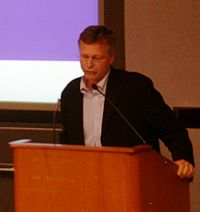- Dani Rodrik
-
Dani Rodrik International Political Economy 
Dani RodrikBorn August 14, 1957
Istanbul, TurkeyNationality Turkish Institution John F. Kennedy School of Government (Harvard University) Field International economics, economic development, political economy Alma mater Harvard University
University of PrincetonOpposed Jagdish Bhagwati Influences Joseph E. Stiglitz Awards Leontief Prize for Advancing the Frontiers of Economic Thought (2002) Dani Rodrik (born August 14, 1957 in İstanbul, Turkey) is a Turkish economist and Rafiq Hariri Professor of International Political Economy at the John F. Kennedy School of Government, Harvard University, teaching in the School's MPA/ID Program. He has published widely in the areas of international economics, economic development, and political economy. What constitutes good economic policy and why some governments are better than others in adopting it are the central questions on which his research focuses. Descended from a family of Sephardic Jews who escaped to Ottoman Empire from the Iberian Peninsula five centuries ago during the Spanish Inquisition,[1] he is affiliated with the National Bureau of Economic Research, Centre for Economic Policy Research (London), Center for Global Development, Institute for International Economics, and Council on Foreign Relations, and is the co-editor of the Review of Economics and Statistics. He has been the recipient of research grants from the Carnegie Corporation, Ford Foundation, and Rockefeller Foundation. Among other honors, he was presented the Leontief Prize for Advancing the Frontiers of Economic Thought in 2002 from the Global Development and Environment Institute. He is the among the 100 most influential economists in the world according to IDEAS/RePEc.
After graduating from Robert College in Istanbul,[2] he earned an A.B. (summa cum laude) from Harvard College, followed by a Ph.D. in economics and an MPA from Princeton University.
He also writes for a Turkish daily newspaper (Radikal) since July, 2009.
He joined the newly created World Economics Association as member of the executive committee, in 2011.
Rodrik's cautious account of the opportunities and challenges presented by integration into the global economy are an exception to the general view of professional economists, according to Martin Wolf.[3]
He is married to the daughter of retired General Çetin Doğan.
Selected publications
- Rodrik, Dani (2011). The Globalization Paradox. Norton & Company, Inc. ISBN 978-0-393-07161-0.
- Rodrik, Dani (2007). One Economics, Many Recipes. Princeton University Press. ISBN 0-691-12951-7.
- McMillan, Margaret; Horn, Karen; and Rodrik, Dani (2004). "When Economic Reform Goes Wrong: Cashews in Mozambique". Brookings Trade Forum 2003: 97–165.
- Rodrik, Dani (ed) (2003). In Search of Prosperity: Analytic Narratives on Economic Growth. Princeton University Press. ISBN 0-691-09268-0.
- Rodrik, Dani (2001). "The Global Governance of Trade As If Development Really Mattered". UNDP. http://system2.net/ukpgh/wp-content/uploads/rodrikgovernance.PDF.
- Rodrik, Dani (1999). The New Global Economy and Developing Countries: Making Openness Work. Overseas Development Council. ISBN 1-56517-027-X.
- Rodrik, Dani (1997). Has Globalization Gone Too Far?. Institute for International Economics. ISBN 0-88132-241-5.
References
- ^ New York Times, 30 January 2007, Economist Wants Business and Social Aims to Be in Sync
- ^ Turkishtime Article (in Turkish)
- ^ "Why Globalization Works" (Yale University Press 2005) ISBN 0-300-10252-6, page 8.
External links
- Who's Dani Rodrik
- Dani Rodrik's home page
- Dani Rodrik's latest research
- Dani Rodrik's weblog
- "Roads to Prosperity" Dani Rodrik's op/ed column for Project Syndicate.
Categories:- 1957 births
- Living people
- Anti-globalization writers
- Alumni of the École Normale Supérieure
- Harvard University alumni
- Princeton University alumni
- Robert College alumni
- John F. Kennedy School of Government faculty
- Trade economists
- Turkish academics
- Turkish economists
- Turkish Jews
- Turkish expatriates in the United States
Wikimedia Foundation. 2010.
